In Ghana, when travelers come from a distance and greet the village Elders or Chief, they begin with polite introductions and then add “we have no bad news,” followed by “all is well.” The rest of the conversation can be relaxed. So today, the news is not bad — it has been difficult, but not bad. We have a lot to be thankful for.
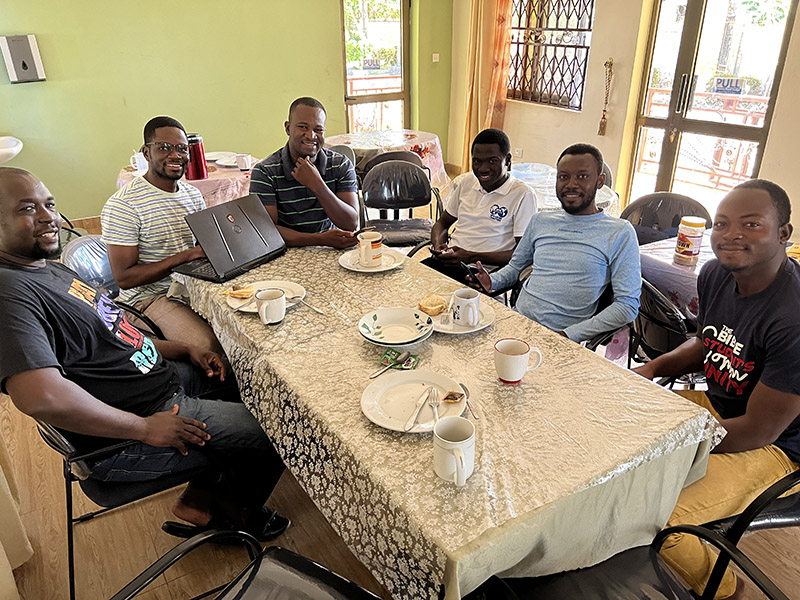
It was our big day to visit the Chakali. They are a small, isolated tribe and number only about 9,800 members. Their language has no written form, so the BiblePlus+ audio is ideal. “Evangelist Zach,” a local Wali speaker from Wa described the Chakali language to us as “completely different from all other nearby Ghanaian languages — like English to Chinese.”
Ray has not been feeling well, and so we left Ray at the guest house to relax and get some work done. David went back to the hospital to record more community health information. Zach, who has been to the Chakali villages and will be recognized by the tribal Elders, came along with Cyrus (the newest motorcycle missionary), Enoch, and Joshua.

As we moved from blacktop to gravel to deeply rutted single-track dirt road, I tried to focus on smooth driving. Cyrus was sitting in the back of the pickup truck, enjoying a red dust bath. I quickly glanced in the rear view mirror during one sharp turn. Cyrus leaned out of view and disappeared. For a moment, the world froze. I blurted out “Do we still have Cyrus?” — an utterly useless exclamation at that point. I looked back into the mirror and saw him. Whew. I redoubled my efforts. The conversation in the car washed away and I plotted vectors across ruts, puddles, and small rivers.
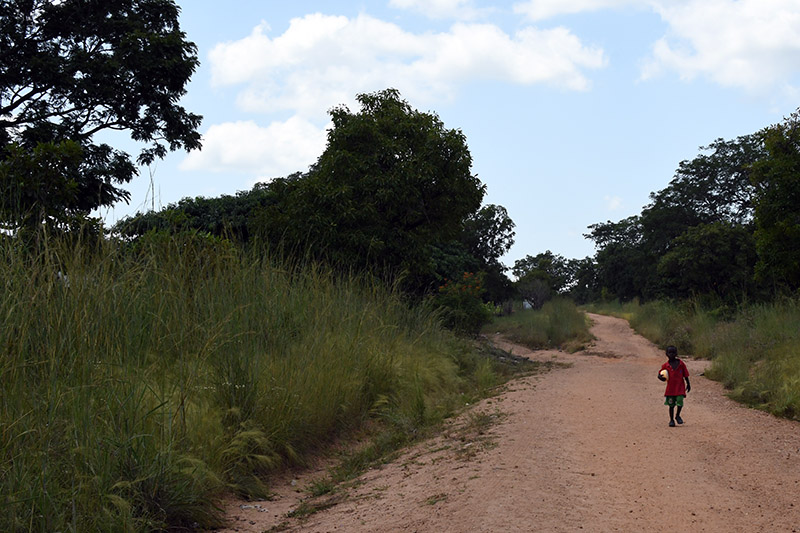
The village of Ducie is deep in Chakali-land. There are no stores, no electricity, and no mobile phone network — just beautiful African bush country. The Chakali are subsistence farmers. Green hills sprawl out into the distance. Tall grasses hem us in. None of us is too interested in walking into the bush for a bio break. A troop of baboons, maybe 30 in total, dash across the road. Baby baboons grip their mothers tightly, hanging under the moms, just inches above the ground.
After stopping under a tree for lunch, we explain to Joshua, Enoch, and Cyrus how a tailgate party works in the USA.
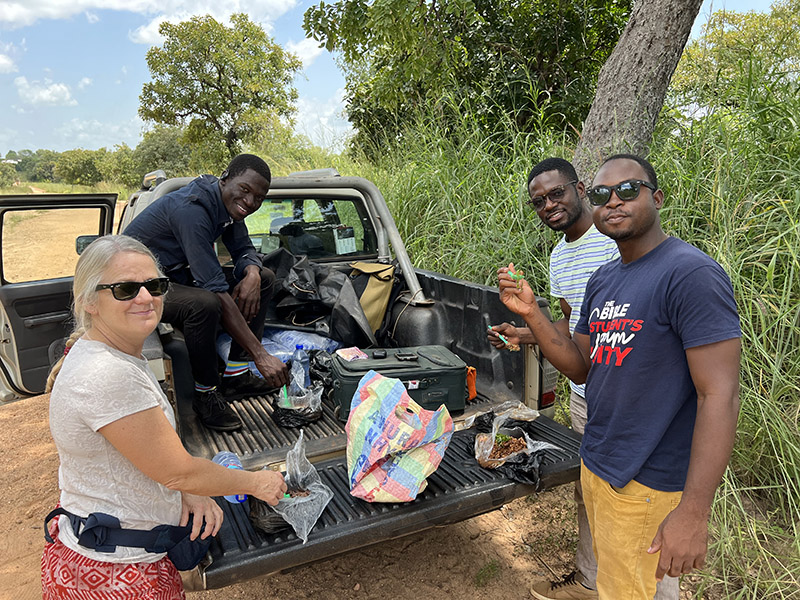
Even though we are a kilometer or two from the village, some of the children have started to find us. They are initially very timid, but slowly approach. Strong women balancing large pans on their head emerged from a dense path hidden in the grass. After seeing us on the road, they refuse to approach. As the boys start answering our classic English questions: “What is your age?” “What is your name?” “What is your grade?” and begin to giggle, the women take a few steps closer, but they remained 30m up the road, watching and talking among themselves. How fascinating it would be to hear their descriptions of the whites eating food out of the back of their truck. We continued our simple conversations with the young boys who had learned some English in school. Curiously, the young men posed no questions. They didn’t ask why we were there, what our names were, or who we were going to see. Are such questions considered impolite in Chakali? After enough laughing and pranking with the boys, the women waiting on the road proceed toward us in unison, nervously looking at each other, confirming that all four of them will go together toward the truck. The hard working women made eye contact and beamed from ear to ear as they gracefully passed.
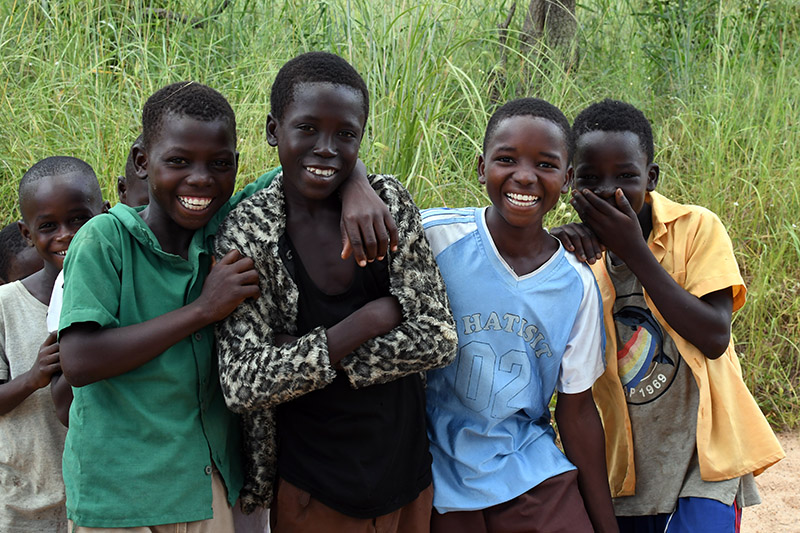
In the center of town, a few old women were seated, selling local veggies and occasionally comforting a toddler in their charge. I parked the car and we began a vital next step… progressing through the chain of Elders to the Chief, to get permission to record.
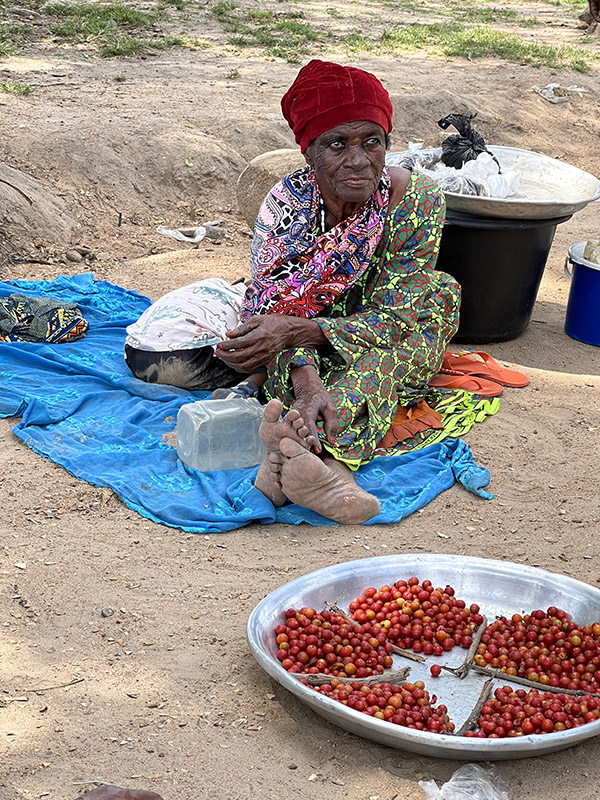
Our first stop is with one of the Elders of the village that Zach has met before. His “receiving room” consists of a few rough-cut boards arranged under a tree. We wait. After the Elder is seated, Zach begins the very detailed social dance of showing respect, providing introductions, showing respect, providing thanks, showing more respect, and finally explaining why we have arrived. The Elder’s posture and expression make it clear he is thoughtfully considering the discussion.
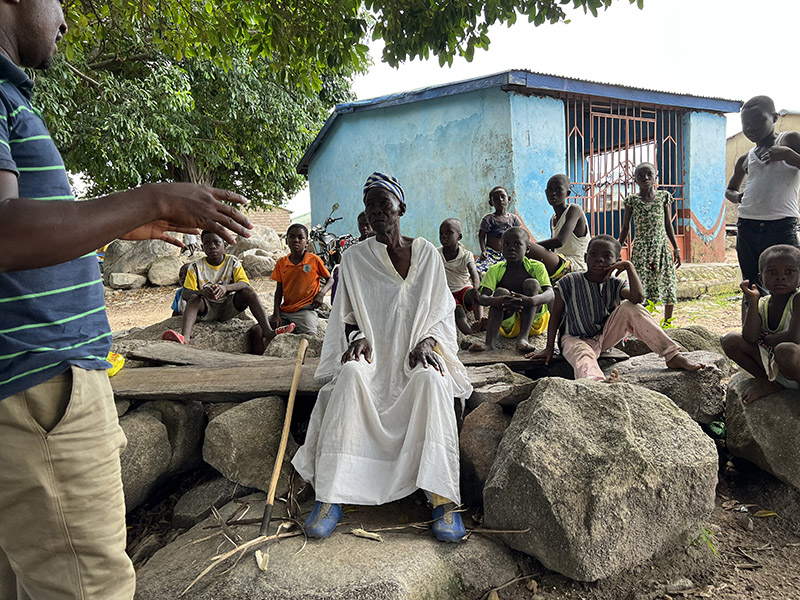
After a handful of minutes we thank him, and rise to leave. It is only then we realize we only have secured permission to meet with the Elders and the Chief. Our stroll through town, weaving past the small homes brings out the curious.
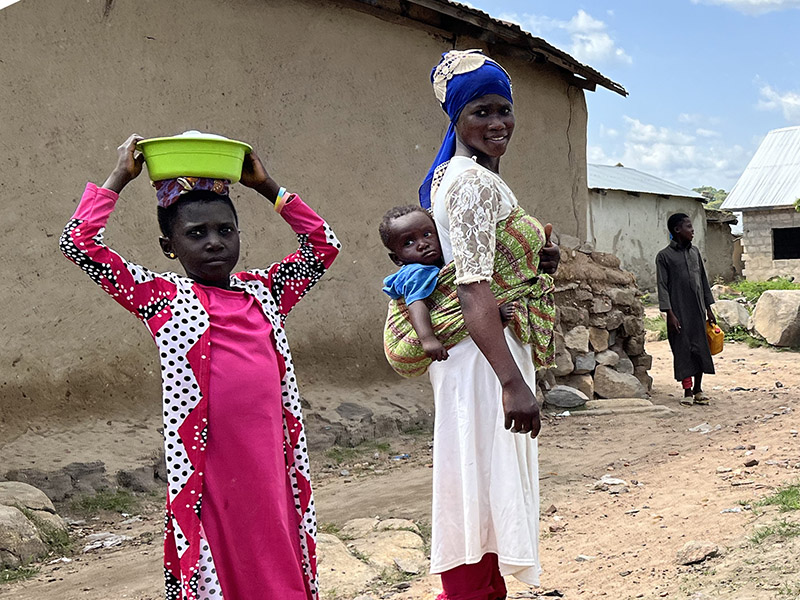
In a small shelter, the Elders and Chief have arranged themselves according to rank. The lowest ranking Elder is sitting on the left, with only his feet visible in the photo below. Going clockwise around the hut the Elders are arranged. In the sloped seat in the middle, with the white and blue shirt is the Chief, who keeps his back toward us, and never turns around during the entire exchange. Zach expertly presented our case.
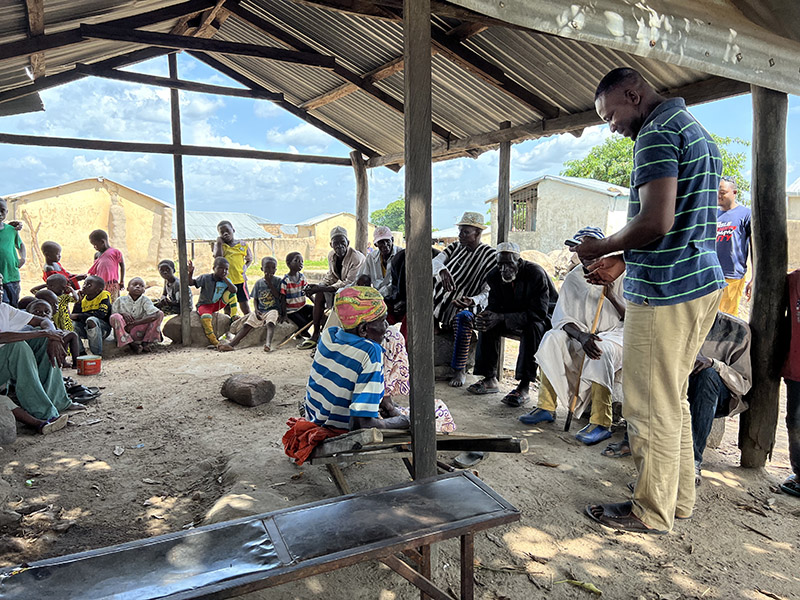
Some tension was clearly evident in the body language and discussions between the Elders, and I nervously looked at my watch as the time drifted by. Zach explained later that there was some history with previous visitors who tried to stay in the village to learn the language, but were turned away. Eventually, Zach requested 10 Ghanaian Dollars from us (less than $2), and he passed it to the lowest ranking Elder, who then passed it up the chain, with each Elder required to touch and examine the gift before it was given to the Chief. Later that day, we learned that for hundreds of years, because of an agreement between the Wali and Chakali, the Chief of every Chakali village is Wala. The Chakali have little social status.
With the Chief’s blessing, who never looked at us, we packed up and sped to the church to begin recording the choirs and testimonies. Without electricity, we carefully set up our tasks and arranged the choir and speakers.
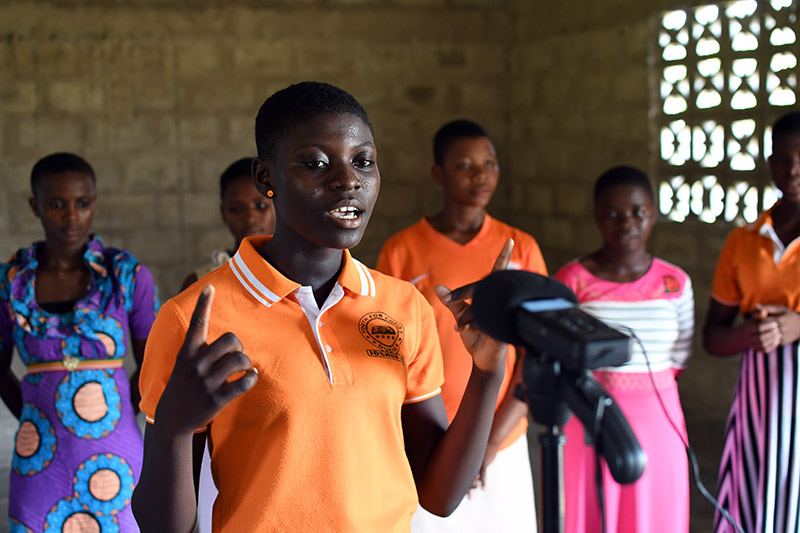
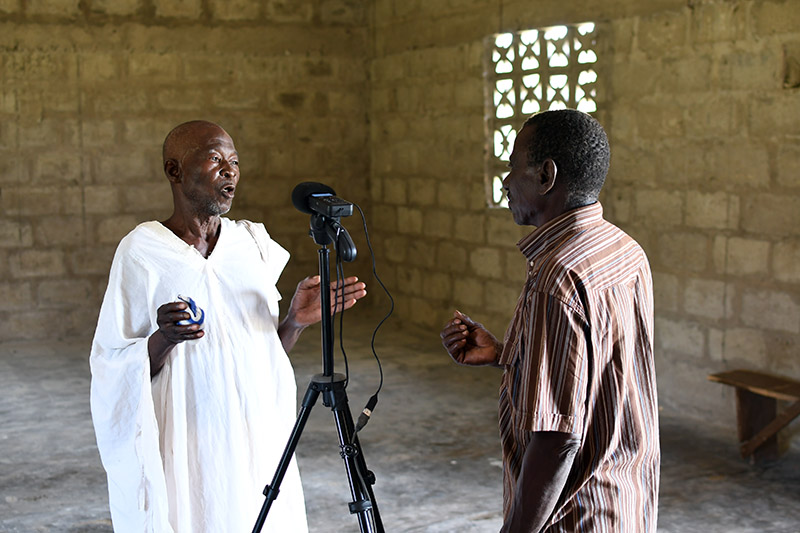
The choir was magnificent, but reserved. The singer’s shifted their weight from side to side, straining with the desire to dance. But we had rushed in after receiving the Chief’s blessing and had not spent any time meeting the singers, laughing with them, explaining why we were there, praying with them. Their voices rang out, but their feet did not even shuffle. We were too foreign. If we had spent an hour talking, with translation, I’m sure they would have joyfully shared their local worship style. A lesson learned. Even so, the voices were clear and powerful.
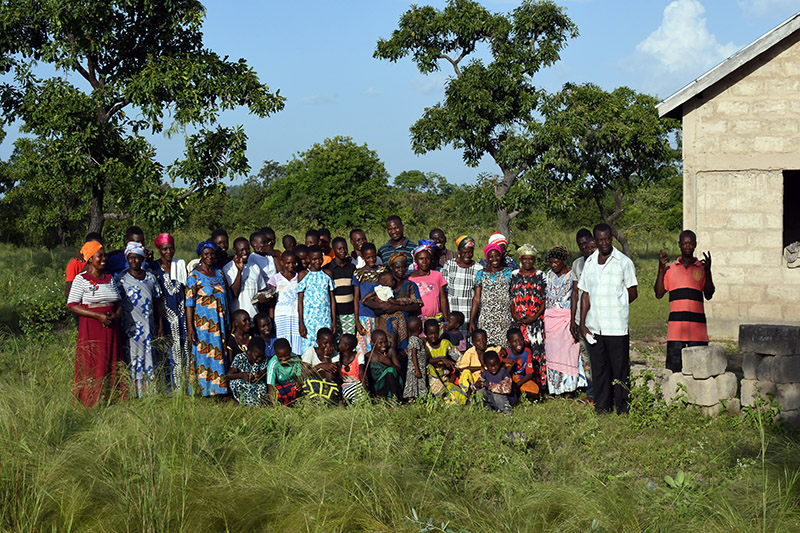
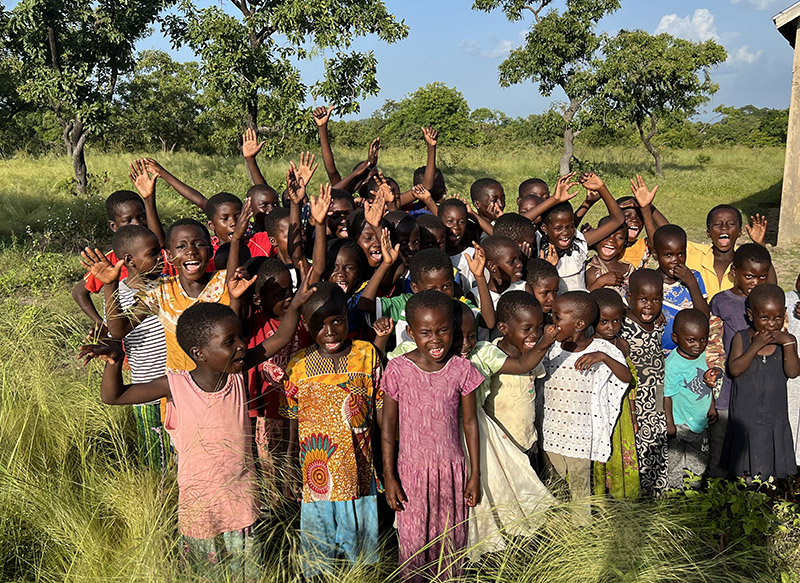

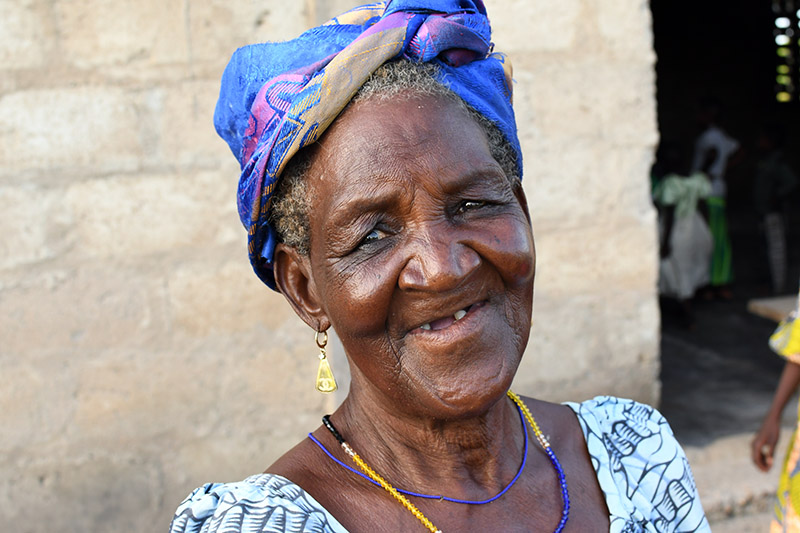
By 4:30, golden hour had arrived. Normally, it would be the most ideal time for photos, but we were frantically packing. It took 2.5 hrs to get to Chakali-land, and we really needed to be back on the gravel road before dark. I could feel Beth’s anxiety as she prompted everyone to pack and load. At one point, she was left alone in the church watching the gear when the entire group of children in the photo above surrounded her asking for food and water. Life out here is challenging. A drink of cool water is a treat. From outside the church we heard Beth call out in a sharp voice, “JOSHUA!”. He ran inside and helped manage the well-meaning but growing chaos of children surrounding Beth.
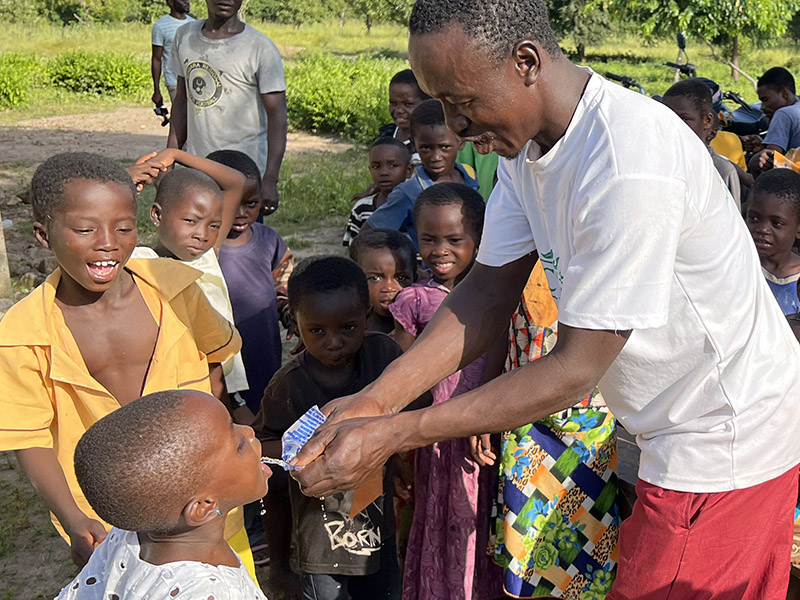
We passed the choir director 2 or 3 cold water bags. He tore open a corner and gave a small squirt into each child’s mouth. Cold, clean water. A treat we take for granted.
As darkness fell, we were off the dirt road and finally got mobile phone service — inside the truck a chorus of bongs, dings, and twinkles rang out as the new messages poured in. David, who had stayed back at the guest house with Ray, had sent the following WhatsApp to me:
Please be praying for pastor Ray, he is developing fever and cough.
Immediately, we all stopped and prayed. Naturally, the thought it could be Covid came to mind. Our friend Doctor Priscilla would also head over to check on Ray. With Cyrus still sitting in the rear of the truck, we dared not speed up. Driving at night is already quite difficult.
Back at the guest house, I went to check on Ray. His temperature was 101.5 and his pulse 130. His O2 saturation was 96%. He was coughing and felt horrible. Ray works non-stop, and both Typhoid and Malaria really overwhelmed Ray this year. His strength and immune system need some recovery time. Doctor Priscilla arrived and also checked on Ray. She did not believe he had Covid. Beth and I had in our luggage some Covid quick tests (antigen), which correctly detect negative for Covid 99.2% of the time, and will correctly show a positive 82% of the time.
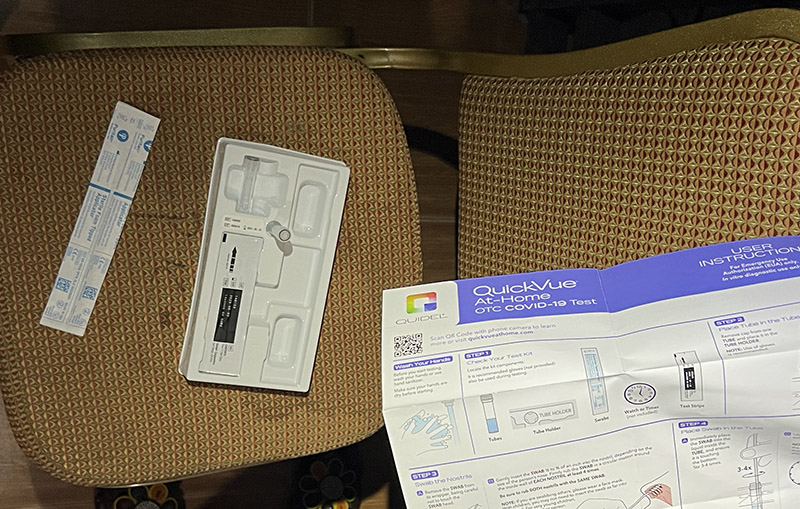
Ray sat outside in a chair, with his head back and eyes closed as Priscilla reviewed the instructions and I gently rotated a cotton swab in Ray’s nose. When I was done swabbing, I told Ray I had snapped a few photos. We all laughed. Doc P and I assembled the test and waited 10 minutes. We prayed, told jokes, and silently wondered what we would do if Ray was positive.

The blue control strip indicated the test was functioning properly. The missing pink strip indicated Ray did NOT have Covid. Whoohooo! I showed Ray the strip and let him know he was not pregnant. Of course, Ray did still feel horrible. We made him some Gatorade and Doc P gave him some over-the-counter cold remedies.
So, we bring good news. Ray is doing better, we made it to the Chakali village, and we have started a partnership with them that we hope will blossom. God is full of mercy. Thank you for your prayers. Please continue to pray for Ray and the whole team. Their work is challenging.
Amen!

Praying for Ray.
Thank you, Fred! Ray is feeling better today, so please keep up the prayers for complete recovery!!
Love,
Beth
Wonder what the African term for “courageous” is…We are praying for ALL of you courageous souls – Ray, the team, Pete and Beth! May God give you health, strength and insights to fulfill your continued mission. May your efforts be blessed. Amen
Praying for you and Beth, your family at home, and also for Ray.
Thank you, Margaret! We are so grateful for all the love, support and prayers!
Beth
Smiles and tears as I watch and read your journey among the Ghanaians accompanied by prayers for blessing, protection, healing, provision, love, and grace. Thank you for sharing your journey.
Thank you, dear friend, for joining us on our journey! It has been an exciting adventure from beginning to end!!
Love,
Beth